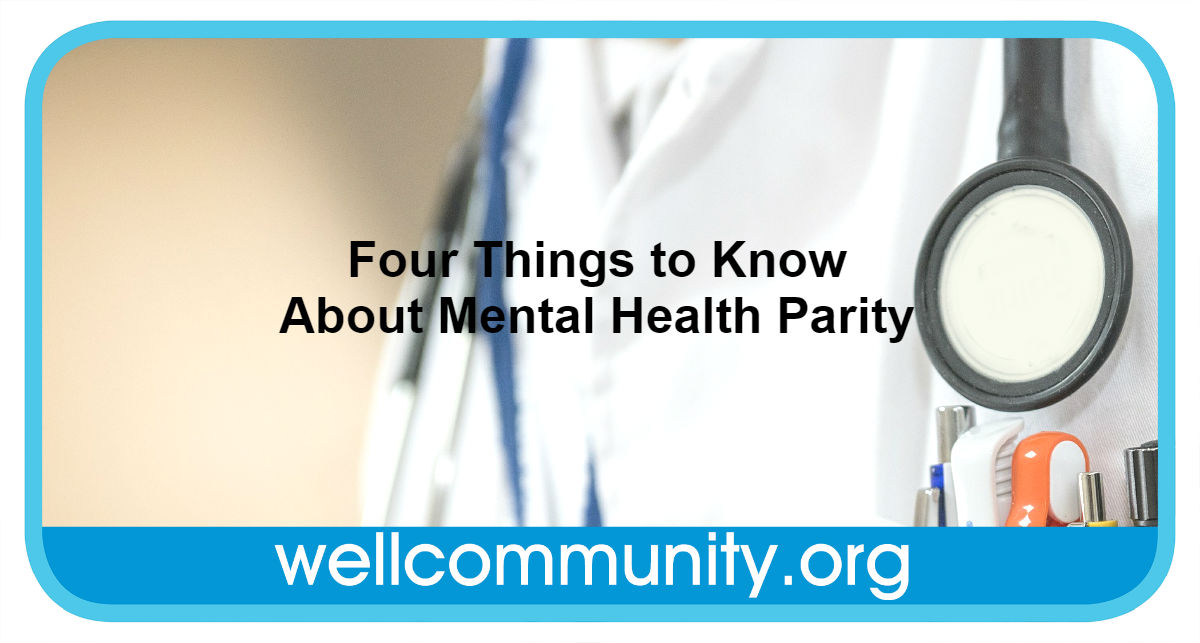
Almost half of the 60 million people living with mental health conditions in the United States go without any treatment according to the National Alliance on Mental Illness (NAMI). While many factors prevent those suffering from mental health challenges from seeking care, disparities in access to quality, affordable care play a major role.
The opposite of this disparity is mental health parity, which NAMI describes as “the equal treatment of mental health conditions and substance use disorders in insurance plans.” In other words, insurance plans must offer the same level of coverage for mental disorders as they do for conditions like diabetes or heart disease.
Until a few years ago, insurance companies could deny individuals coverage based on pre-existing mental health conditions, and many plans covered mental health services on a very limited basis. But federal law now helps prevent this. The Paul Wellstone and Pete Domenici Mental Health Parity and Addiction Equity Act (MHPAEA), passed by congress in 2008, mandated that insurance plans cover treatment for mental illness and addiction at the same level as physical illness.
However, this is far from a guarantee that those who need mental health services will receive the care they need. Below are four things to know about mental health parity in the United States, and how it impacts Texas residents.
Some insurance plans are exempt.
The MHPAEA requires only insurance plans that meet certain criteria to follow parity guidelines. While most group insurance plans as well as individual plans purchased through Health Insurance Marketplaces must comply, numerous plans are exempt.
Mental health coverage doesn’t equal access to quality care.
Those who have plans that cover mental health care may still struggle to find providers who accept their insurance. Many areas in the United States suffer from a severe shortage of mental health professionals, especially practitioners who accept insurance: A study published in JAMA Psychiatry found that just 55 percent of psychologists accept insurance compared to 89 percent of other types of medical specialists. This is a particularly serious problem in Texas, which ranks 49th among all states in access to mental health care.
While access is an issue for health care in general, mental health care can be particularly hard to obtain. A 2016 NAMI report revealed that individuals seeking an in-network mental health therapist were nearly twice as likely to have difficulty finding one as those seeking another type of medical specialist. This study also found that people were more than twice as likely to have trouble finding a psychiatric hospital that would accept their insurance compared to other types of hospital care.
As a result, those receiving mental health services tend to pay more out of pocket than those getting other sorts of medical care. This can prevent those who need care from making appointments as frequently as recommended and often keeps them from receiving care at all.
Those who need the most care are often the most impacted by disparity.
Many times, those struggling with the most life-altering mental health challenges are those who are most hurt by mental health care disparity. Individuals living with serious mental illnesses often aren’t able to work due to stigma and the daily challenges of managing their conditions. As a result, they’re less likely to have health insurance; those who are insured are less likely to be able to afford co-pays. And, due to the higher rate of poverty among people dealing with serious mental disorders, these individuals are more likely to live in areas that lack adequate mental health services.
A recently passed law provides more protection for some Texans.
In 2017, the Texas Legislature passed House Bill 10, which strengthens the state’s authority to enforce parity standards. It also mandated the creation of an ombudsman to help both uninsured and insured individuals access mental health services. However, it will take several years until the practices stipulated in this law are fully implemented.
Since 2002, The Well Community has come alongside those in the Dallas area who struggle with serious mental illnesses, helping them pursue recovery and access the resources and care that are available to them. Its services are particularly vital for residents of Oak Cliff and the surrounding area of southern Dallas, where quality mental health services are scarce. Your gift will help The Well continue to support individuals living with severe mental illnesses and very limited resources in an area where options are limited.
Be sure to follow us on Facebook and Twitter to learn more about The Well, mental illnesses and how you can make a difference in the lives of those who struggle with them.
